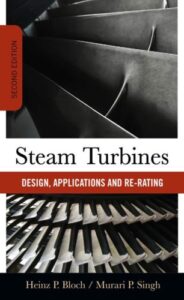Steam Turbines Design Application and Re-Rating 2nd edition
Steam Turbines Design Application and Re-Rating 2nd edition
Steam Turbines Design Application and Re-Rating 2nd edition text is intended to provide the kind of guidance that will enable the reader to make intelligent choices.We have added Chapter 16 on the upgrading of steam turbines, completely revised the chapter on bearings, and added new information on bearing protector seals, brush seals, oil mist lubrication, and wavy face mechanical seals that promise to replace carbon ring seals in small steam turbines.
While the text cannot claim to be all-encompassing and complete in every detail, it was the coauthors’ hope to make the material both readable and relevant.We believe we have succeeded in making the text up to- date, with practical, field-proven component configuration and the execution of mechanical drive steam turbines discussed at length. The emphasis was to be on the technology of the principal machine, but we did not want to overlook auxiliaries such as fixed-ratio gear transmissions, variable-speed transmissions, overrunning clutches, and couplings.
You can also Read Gas Turbines Materials, Modeling and Performance
Steam Turbines Design Application and Re-Rating 2nd edition
- Preface
![Steam Turbines Design Application and Re-Rating 2nd edition]()
- Acknowledgments
- Introduction
- Turbine Casing and Major Stationary Components
- Bearings for Mechanical Drive Turbines
- Rotors for Impulse Turbines
- Rotors for Reaction Turbines
- Turbine Blade Design Overview
- Turbine Auxiliaries
- Governors and Control Systems
- Couplings and Coupling Considerations
- Rotor Dynamics Technology
- Campbell, Goodman, and SAFE Diagrams for Steam Turbine Blades
- Reaction vs. Impulse Type Steam Turbines
- Transmission Elements for High-Speed Turbo machinery
- Shortcut Graphical Methods of Turbine Selection
- Elliott Shortcut Selection Method for Multi-valve, Multistage Steam Turbines
- Re-rates, Upgrades, and Modifications
- Appendix A. Glossary
- Appendix B. Units of Measurement
- Bibliography and List of Contributors
- Index
The starting point of machinery selection is machinery know-how. From know-how, one can progress to type selection, such as condensing versus extraction versus back pressure turbine, or reaction steam turbine versus impulse steam turbine. Type selection in turn leads to component selection, such as fixed land thrust bearing versus tilting-pad thrust bearing.


Comments are closed.